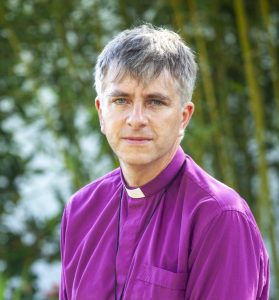Bishop Hugh’s Easter Message
We hear a lot these days about ‘Christian values’. And those values really matter – it matters that we are kind, that we treat one another as we want to be treated and that we respect others whether we agree with them or not.
 Those are each deeply Christian ways of living in the world, and they are rooted in the teaching of the church over millennia. But they’re not uniquely Christian and many traditions and perspectives, both religious and secular, happily live by them too.
Those are each deeply Christian ways of living in the world, and they are rooted in the teaching of the church over millennia. But they’re not uniquely Christian and many traditions and perspectives, both religious and secular, happily live by them too.
What is distinctively Christian, and what marks out Christianity from every other faith and belief system is Jesus’ resurrection. Because everyone knows that dead people don’t come to life; the first followers of Jesus in the 1st century knew it, and we know it now. When someone is crucified, that’s the end.
But the beating heart of Christian faith is that Jesus Christ, a human being like you and me, died and then rose again. In the Book of Revelation Jesus himself says it clearly – ‘I am the Living One, I was dead and now I am alive.’
And that impossible truth is the real heart of what it means to be a Christian. That Jesus rose from the dead and, in that moment, the usual pattern of things – life followed by death – was turned upside down.
And from that greatest truth flow the other reversals of what’s ‘normal’ that define the deepest of Christian values. For instance, everything we in the world see tells us that powerful people who are in charge get to have the final word – but all the power of the Roman Empire didn’t manage to keep Jesus dead. Or, it’s normal to think that punishment is the right response to injustice and wrongdoing – but the risen Jesus didn’t seek out those who had failed him and nailed him to a cross, instead when he meets people he forgives them and gives them back their dignity. Or, it sometimes seems normal that suffering, sin and evil have the loudest voice in the world – but Jesus’ resurrection promises that their power has been removed and that there are other more important voices at work – the voices of compassion, generosity and courage, for instance.
In a world in which violence, injustice and suffering seem so normal, the resurrection opens the door to a new normal and to an alternative pattern of life. Easter tells us that the horrors of war in Ukraine, unimaginable suffering in Gaza and poverty in our own communities, are not normal and never will be. Easter cries out that homelessness and mental illness are not inevitable and never will be. Easter promises us that hope, forgiveness and mercy are available – that they are the normal that we are all offered.
The risen Jesus says – I have begun a revolution of hope. Join me and let’s put things back the way they’re meant to me. Help me build a new ‘normal’.
And I pray that every one of you will hear that invitation again in your own life and in your communities this Easter.
God bless.
